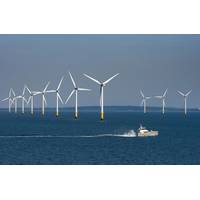Statoil: $32.5 bln for Sverdrup Startup
Development of field could cost up to $32.5 bln; cost estimate higher than analyst forecasts. Sverdrup scheduled to start up in late 2019.
Statoil (STO)'s giant Johan Sverdrup oil field could cost as much as $32.5 billion, the company said in its first full estimate of the price tag to develop Norway's most expensive ever industrial project.
Discovered in 2010, Sverdup is the biggest North Sea find in decades, reinvigorating Norway's oil sector where production has been declining for more than a decade. At maximum, its production would equal nearly half of Norway's current oil output.
The hefty cost topped what analysts had expected, leading them to slightly downgrade the value of the project.
"In our model we have assumed 170 billion (crowns) full field development capex," Thomas Aarrestad, an analyst at Pareto Securities said. "Updating our model to 195 billion crowns, full development capex has a 3 percent negative impact on the net present value of the project."
Still, shares in several of the field's partners including Statoil, Lundin Petroleum and Det Norske rose as the plans indicated the project was on track, contained few surprises, and peak production could be hit sooner than previously predicted.
Statoil, like its peers around the globe, has been cutting capital spending this year to save on costs, but has given priority to Sverdrup as it is estimated to make money at less than $40 per barrel of oil, providing ample returns even if oil prices stay low.
The field could hold as much as 2.9 billion barrels of oil equivalents and produce up to 650,000 barrels per day at its peak in the 2020s. It is scheduled to start up in late 2019 with the second phase kicking in by 2022.
In its initial phase, Sverdrup, which is 95 percent oil, could cost between 100 billion and 120 billion crowns. Full development will cost between 170 billion and 220 billion.
Teodor Sveen-Nilsen, an analyst at Swedbank, said he will likely increase his capital spending expectation by 20-25 percent on Sverdrup, cutting the project's value by 5 percent.
A decision on the second phase of the development is expected in the next one and a half to two years
"We will start production in 2019 and we enter phase 2 in 2022 or earlier, so the peak production will come somewhat after we have brought phase 2 into full production as well," Kjetel Digre, Statoil's project manager for Sverdrup, said.
Statoil said that it has also completed the environmental impact assessment of the field, and studies on how Sverdrup will receive power and export crude. Those studies will be submitted for consultation now and it plans to submit a development plan to the government in early 2015.
The field, which could produce for 50 years, could generate about $200 billion worth of revenues over its lifetime.
Production in the first phase will be in the range of 315,000 to 380,000 barrels per day, with peak production between 550,000 and 650,000 barrels per day, Statoil said.
Sverdrup partners also include A.P. Moller-Maersk and Norwegian state holding firm Petoro.
By Balazs Koranyi and Stine Jacobsen











